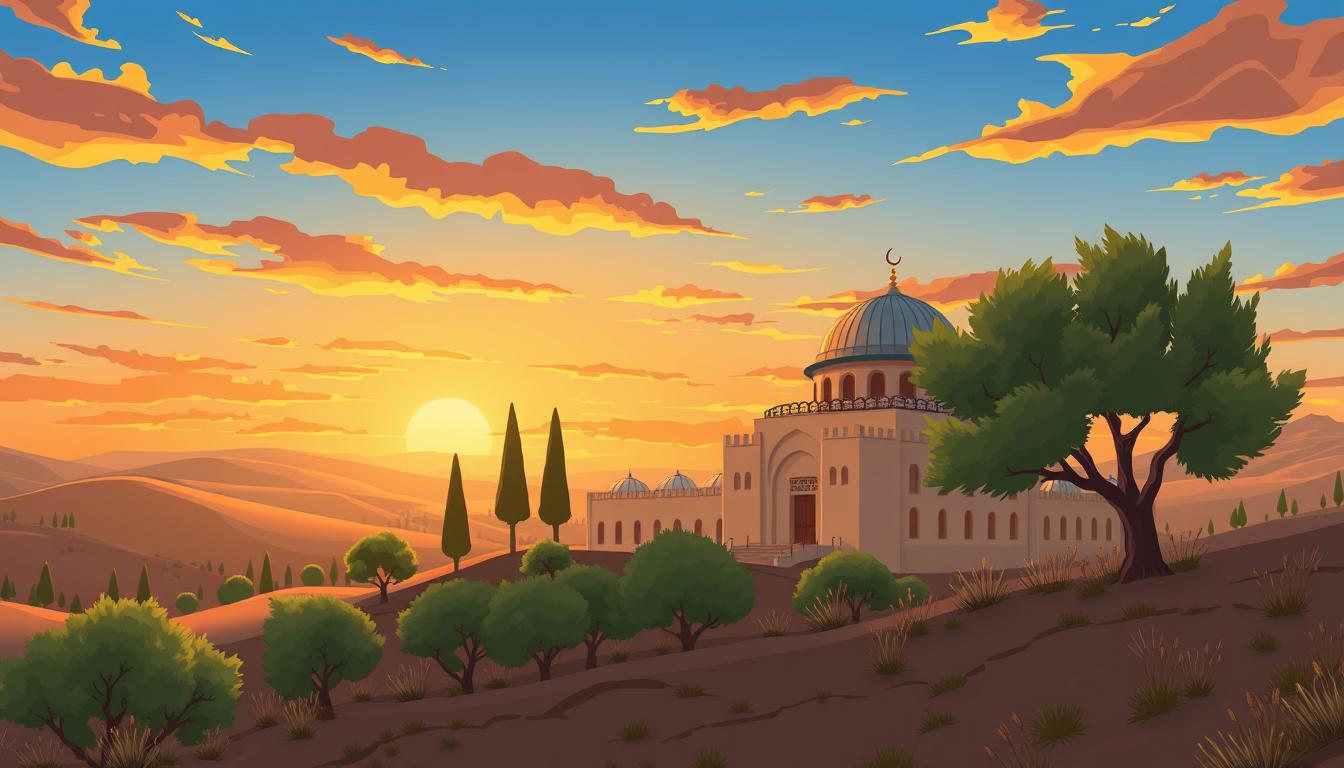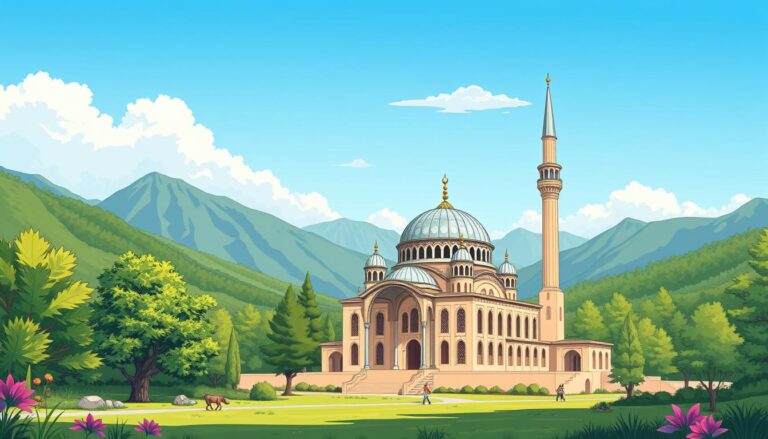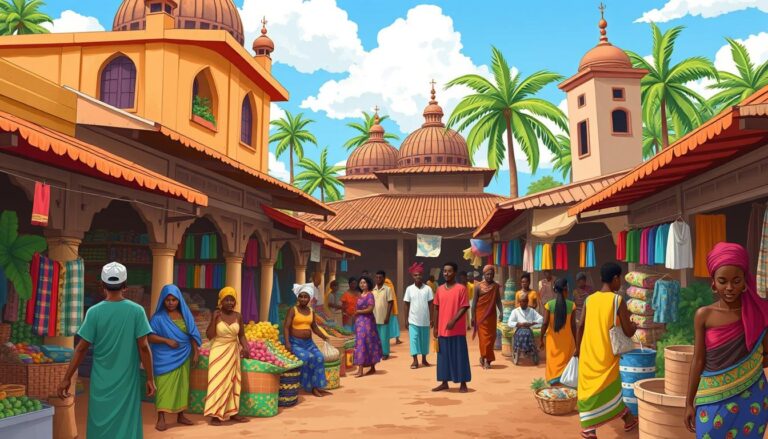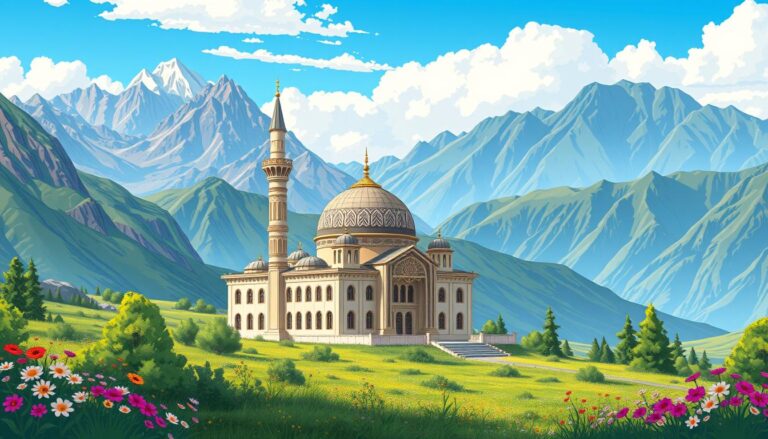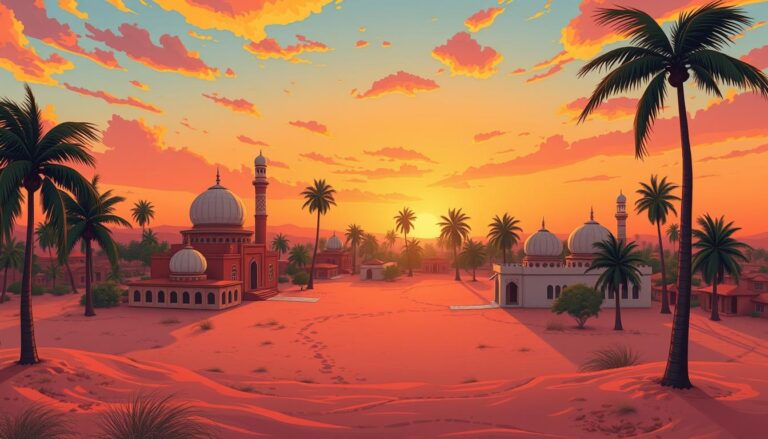Islam in Palestine
Islam is the main religion in the Palestinian territories. In the West Bank, 75% of people are Muslim. In the Gaza Strip, that number jumps to 99%.
Palestine’s history with Islam began in the 7th century. The Arabs, who were Muslim, conquered the area. Since then, Islam has deeply influenced the culture and people of Palestine.
The spread of Islam in Palestine was gradual. It came through nomadic tribes and individual choices. Factors like sedentarization, Sufi influences, and changes in society under Islamic rule helped too.
Origins and Early Spread of Islam in Palestine
In the 7th century, Islam first came to Palestine. In 636 CE, the Rashidun Caliphate, led by Caliph Umar ibn al-Khattāb, took Jerusalem from the Byzantine Empire. This was the start of the Muslim conquest of Palestine.
Caliph Umar then visited Jerusalem. He made a deal with the Orthodox Patriarch of Jerusalem, known as the Umariyya Covenant. This pact allowed Christians to keep their faith in exchange for a tax.
The Rashidun Caliphate was followed by the Umayyad Caliphate. This period saw Islam become the main religion in Palestine. The local people started to speak Arabic and adopt Islamic culture.
Arab Conquest of the Levant
The Arab conquest of the Levant was a key event in Islam’s early spread. The Rashidun Caliphate’s armies took over Syria, Lebanon, Jordan, and Palestine from the Byzantine Empire. This victory helped the Rashidun Caliphate and set the stage for the Umayyad Caliphate to expand Islamic rule further.
“The conquest of the Levant by the Rashidun Caliphate marked a pivotal moment in the early history of Islam, as the religion spread beyond the Arabian Peninsula and established a foothold in the Levant region.”
Islamization under Abbasids and Fatimids
The Abbasid Caliphate rose to power in the 8th century. This marked a big change in Palestine’s Islamization. Scholars think Islam became the main religion in the area. The local people started to see themselves as Arabs and speak Arabic.
The Abbasid era saw Islamic learning centers grow. Sufi mysticism also flourished. It played a big role in turning people to Islam.
Sufi Influence and Conversion to Islam
The Fatimid Caliphate, based in Egypt, took over Palestine in the 9th century. This brought both religious and political troubles. Cities like Jerusalem and Hebron became key spots for Sufi travelers.
They set up Sufi communities and places of learning. These helped the local people turn to Islam. The Sufi influence and Fatimid rule made Islam stronger in Palestine.
“The Fatimid era also saw the creation of locally rooted Sufi-inspired communities and institutions that were part of the conversion to Islam.”
The Abbasid and Fatimid times were key in making Islam the main faith in Palestine. The area moved from being mostly Christian and Jewish to mostly Muslim. Islamic learning, Sufi mysticism, and the rule of these Caliphates all helped in this big change.
The Crusades and Their Impact
The Crusades were a series of religious wars led by Christian Crusaders with support from the Roman Catholic Church. They aimed to take back Jerusalem from the Fatimid Caliphate in 1099. The Crusaders were successful, capturing the holy city and starting a period of Christian rule that lasted until the late 12th century.
The Crusades brought conflict and changed power dynamics in Palestine. The East-West Schism in 1054 had already caused religious differences. The capture of Jerusalem in 1099 led to a massacre of Muslims and Jews, making tensions worse.
Under Crusader rule, Palestine’s population changed. The area went from mostly Christian to mostly Muslim. The Latin Kingdom of Jerusalem was established in 1100. But Saladin’s campaign in 1187 took back Palestine and Jerusalem, giving Muslims control again.
The Crusades had a big impact on Palestine. The region saw conflict, conquest, and power shifts between Crusaders and Muslim dynasties.
“The Crusades marked a significant turning point in the history of Palestine, with the region serving as a battleground for religious and political conflicts between the Christian Crusaders and the Muslim dynasties of the time.”
Islam in Palestine during Mamluk and Ottoman Rule
After the Crusades, the Mamluk Sultanate took over Palestine from 1250 to 1517. Islam was the main religion, with the Mamluks being mostly tolerant of Christians and Jews. But, the Samaritan community saw a big drop in numbers due to Mamluk persecution.
In 1516, the Ottoman Empire took over from the Mamluks. They ruled Palestine until the early 20th century. Islam stayed the main faith, with the Ottomans allowing some religious freedom. By 1600, Palestine had about 219,000 Muslims, 11,000 Christians, and 2,000 Jews.
The Ottoman era brought big changes to Palestine. Figures like Muhammad Ali, an Albanian, played key roles in politics. The Peasant’s Revolt of 1834, sparked by taxes and conscription, also shaped Palestinian identity.
“The Mamluk and Ottoman periods were marked by a complex interplay of religious tolerance and occasional persecution, as Islam maintained its dominant position in the region.”
Even with challenges, the Mamluk Sultanate and Ottoman Empire let Islam in Palestine thrive. They shaped the region’s religious scene for centuries.
Importance of Jerusalem in Islam
Jerusalem is very important in Islam, after Mecca and Medina. It’s where the Al-Aqsa Mosque is, believed to be the spot the Prophet Muhammad went to heaven from.
The Dome of the Rock is next to the Al-Aqsa Mosque. It’s a key site in Islam. The Qur’an talks about the Prophet’s journey from Mecca to Jerusalem, and the Al-Aqsa Mosque is mentioned in many traditions.
Jerusalem was the first place Muslims prayed towards before it changed to Mecca. It’s said to be a place of great spiritual value. Prophets prayed there, and angels were present.
“Jerusalem is considered a place of significant spiritual importance in Islam as it was the first Qibla (direction of prayer) before it was changed to Mecca.”
The importance of Jerusalem in Islam, or Al-Quds, is deep. The Dome of the Rock and the Al-Aqsa Mosque are symbols of its sacred status. They show why Jerusalem is so important in the Muslim faith.
Islam in Palestine in Modern Times
In today’s world, Islam is the main religion in Palestine. Muslims make up 75% of the West Bank’s people and 99% in the Gaza Strip. Jerusalem and the Al-Aqsa Mosque are key to Palestinian identity. They are also a major reason for conflict with Israel, which controls East Jerusalem and the Palestinian territories.
Palestinian Muslim Demographics
The Palestinian Muslim population has grown a lot in recent years. This is because of high birth rates and a young population. There are about 5 million Muslims in the occupied Palestinian territories, making up most of the people. This change has greatly affected the area’s politics and society, with Islam in modern Palestine becoming more important in the conflict.
The religious and cultural significance of Jerusalem and the Al-Aqsa Mosque complex is very important to Palestinian Muslims. They fight to keep control over these holy places and the area around them. This has caused many problems with the Israeli government, which wants to keep control over the occupied lands and Jerusalem.
“The conflict in Palestine captures the attention of the vast majority of Muslims worldwide, as the region is seen as the heart of the Muslim civilization and the site of some of the most sacred Islamic sites.”
The growth of the Palestinian Muslim population and the importance of Islam in modern Palestine have big effects on the region’s future. The Palestinian Muslim population is shaping the politics and society of the ongoing fight with Israel.
Islamic Movements and Hamas
Hamas, a key player in Palestine since 1987, has roots in the Muslim Brotherhood. It uses militant Islam to fight for Israel’s destruction. This Sunni extremist group aims to end Israel’s existence.
Hamas Covenant and Ideology
Hamas differs from the secular PLO. It sees resistance as a religious duty, or jihad. The 1988 Hamas Covenant shows its Islamic views and refusal to make peace with Israel.
Even with charter updates, Hamas remains committed to its Islamist goals. Iran supports Hamas, providing arms, training, and funds since the late 1980s. This backing strengthens Hamas’s extremist views and its fight against Israel.
- Hamas was founded in December 1987 during the first Intifada uprising.
- The group’s 1988 Hamas Covenant outlined its Islamic ideology and rejection of peace with Israel.
- Hamas has been designated as a terrorist organization by several countries, including the United States and European Union.
- The group has received substantial support from Iran, which has provided it with funds, weapons, and training.
- Hamas has been involved in multiple wars with Israel, including conflicts in 2008–09, 2012, 2014, 2021, and an ongoing conflict since 2023.
“We will not accept any… coexistence with Israel… [or] any negotiated settlement of the Palestinian problem.” – Hamas Covenant, 1988
The Israel-Hamas conflict has caused a lot of trouble in the area. The 2023 violence has killed nearly 40,000 people by July 2024. The U.S. has promised billions in military aid to Israel. Iran keeps helping Hamas and other Palestinian groups financially and militarily.
Islam in Palestine
Islam is the main religion in Palestine, with most people being Muslim. The area was conquered by the Arab Rashidun Caliphate in the 7th century. Over time, Islam spread through tribes and individual conversions, thanks to Sufi influences and changes in society.
Today, Islam is key in the lives of Palestinian Muslims. It shapes their identity, traditions, and their struggle with Israel. About 99% of Palestinians are Muslim, with Christians making up less than 1%. The Palestinian population worldwide is around 12.7 million, with 1.5 million in Israel, 6 million in Arab countries, and 700,000 elsewhere.
The conflict has led to big humanitarian problems. Many Palestinians lack basic needs like water, food, and medical care. Yet, their Islamic faith remains strong, with many showing love for God and the Prophet Muhammad even in hard times.
“The percentage of Palestinians in Gaza reaffirming their love of God and the Prophet Muhammad during desperate circumstances is a testament to the enduring importance of Islam in their lives.”
The Palestine Children’s Relief Fund (PCRF) helps children and families in the area. They do projects like building hospitals and sponsoring orphans. Their work shows the faith and resilience of Palestinian Muslims facing tough challenges.
Islamic Traditions and Practices in Palestine
Palestinian Muslims follow a rich set of Islamic traditions deeply rooted in their history and culture. The holy month of Ramadan is celebrated with fasting, prayer, and community. The Eid al-Fitr and Eid al-Adha festivals, marking Ramadan’s end and the Hajj pilgrimage, unite the Muslim community in Palestine.
Ramadan and Eid Celebrations
During Ramadan, Palestinian Muslims fast from dawn to dusk. They share Iftar meals with family and friends, focusing on prayer and spiritual reflection. The Eid al-Fitr and Eid al-Adha festivals that follow are filled with joy, festive gatherings, special meals, and charitable acts.
“Ramadan is a time of spiritual renewal and community togetherness for Palestinians. The joy and camaraderie of Eid celebrations bring the entire Muslim population together, strengthening our cultural and religious bonds.”
– Fatima Mahmoud, Palestinian resident of Bethlehem
These Islamic traditions in Palestine are crucial in shaping the region’s cultural identity and social fabric. From Ramadan to Eid festivities, Ramadan in Palestine and Eid celebrations in Palestine are deeply rooted in Palestinian Muslim lives.
Conclusion
Islam has been a key part of Palestine’s culture and faith for centuries. It started in the 7th century when Arabs conquered the area. Over time, Islam spread through people moving and converting, thanks to Sufi teachings and Islamic rule changes.
Today, Islam is the main religion in the Palestinian territories. It influences their identity, traditions, and conflict with Israel. Places like the Al-Aqsa Mosque and the Dome of the Rock in Jerusalem show Islam’s deep importance in Palestine.
The ongoing fight for self-rule and statehood is deeply tied to Islam. Understanding the mix of religion, nationalism, and politics is key to finding peace. This will help solve the long-standing issues in the area.
Source Links
- West Bank and Gaza – United States Department of State
- The Palestinian Struggle Through the Prophetic Lens | Yaqeen Institute for Islamic Research
- Religion and the Israel-Palestinian Conflict: Cause, Consequence, and Cure
- Islam in Palestine
- Teachers Guide – Muslims | Teacher Center | FRONTLINE
- Islamization of Jerusalem
- The Rise of Islam – Welcome To Palestine
- The Crusades – Welcome To Palestine
- Palestine – Crusades, Holy Land, Conflict
- The Rise of Islam – continued – Welcome To Palestine
- The Holy Land from the Mamluk Sultanate to the Ottoman Empire: (1260–1799)
- Why Jews and Muslims Both Have Religious Claims on Jerusalem | HISTORY
- Religious significance of Jerusalem
- Palestine, Islam, and the West
- Why Do Muslims Care About Palestine?
- ‘The Palestinian Problem Is a Religious Problem’ | SAPIR Journal
- Doctrine of Hamas
- What Is Hamas?
- Hamas
- Palestine – Minority Rights Group
- Who Are the Palestinians?
- What Palestinians in Gaza are teaching Muslims worldwide
- Palestinian – Religion
- Jews, Muslims, And An “Origin Story” Of The Arab-Israeli Conflict
- The Muslim Claim to Jerusalem
- Intersectionality and Palestine Solidarity: Why Muslims Need to Lead the Gaza Protests | Blog | Yaqeen Institute for Islamic Research
- Palestine and the Arab World: A relationship in crisis? | Brookings

